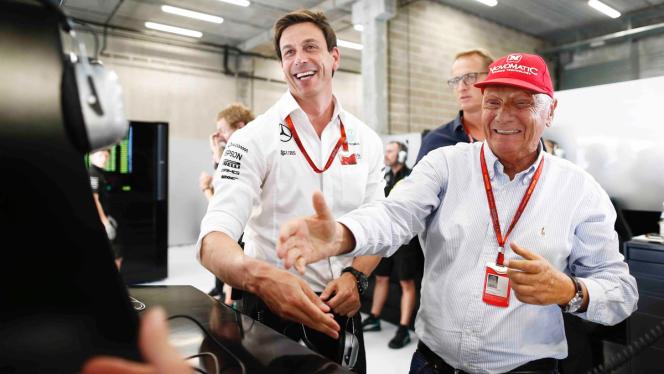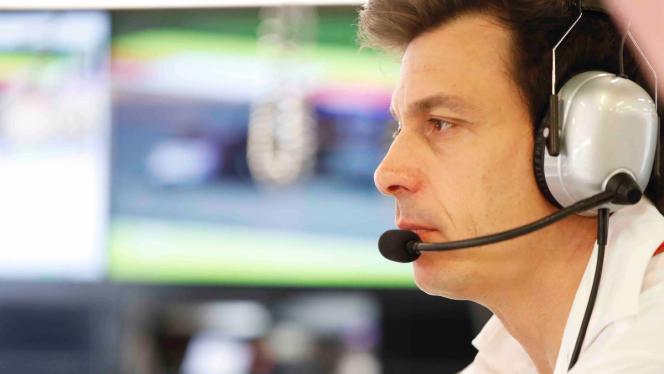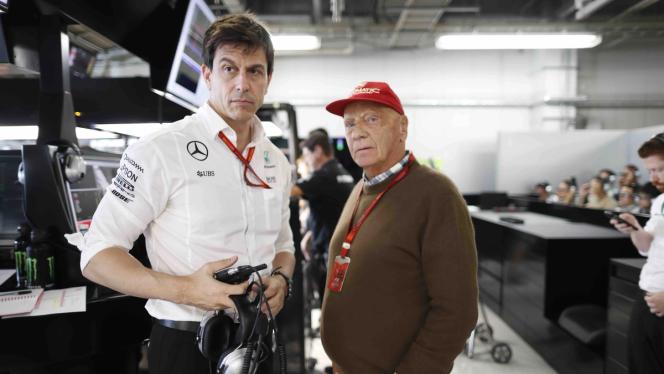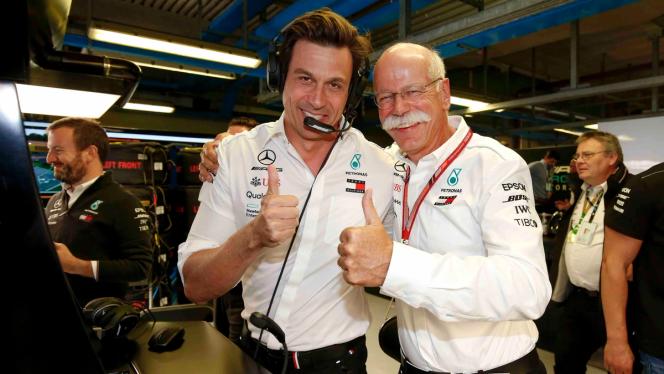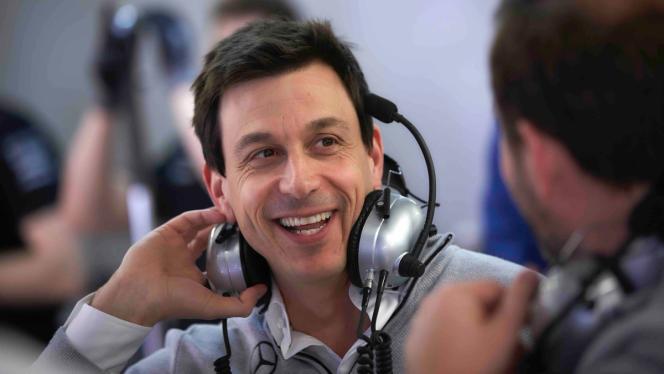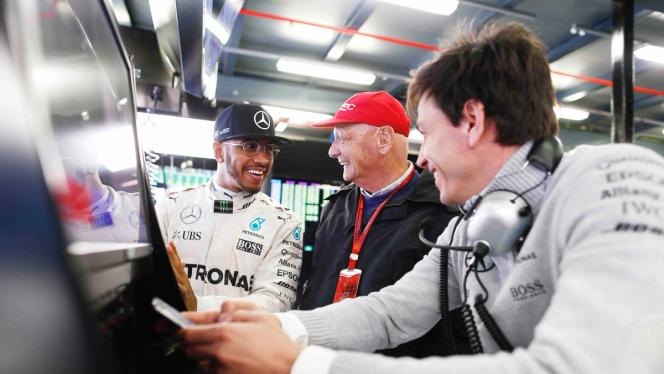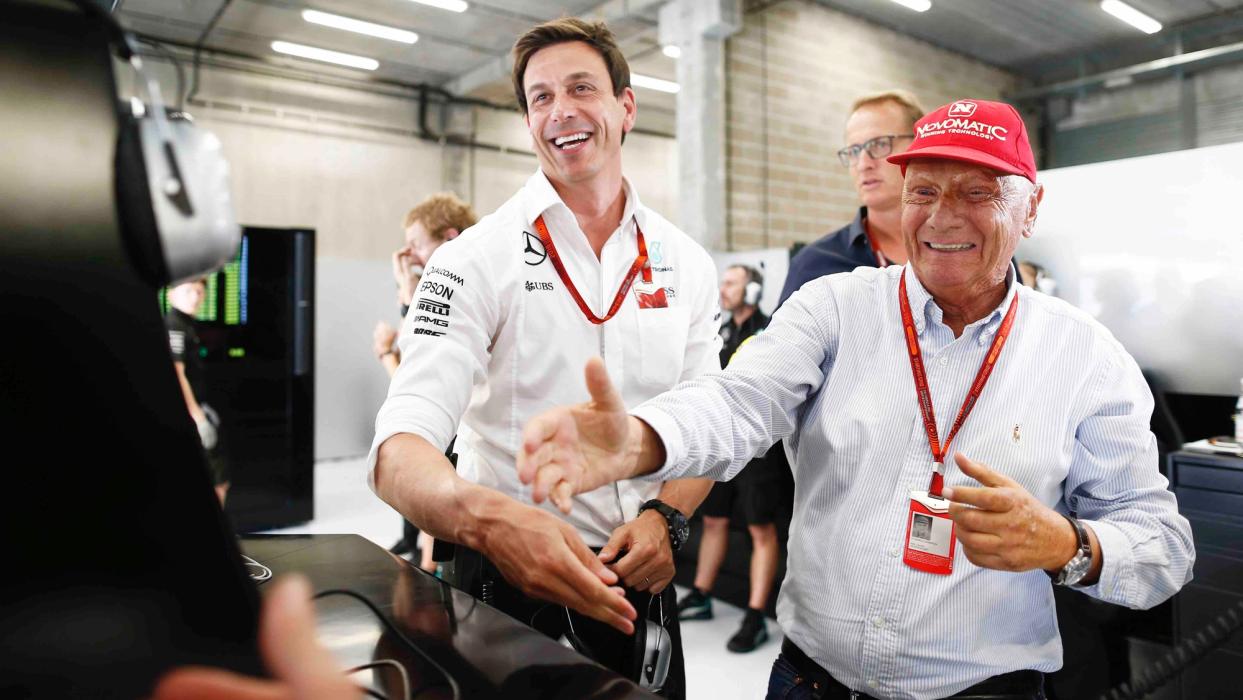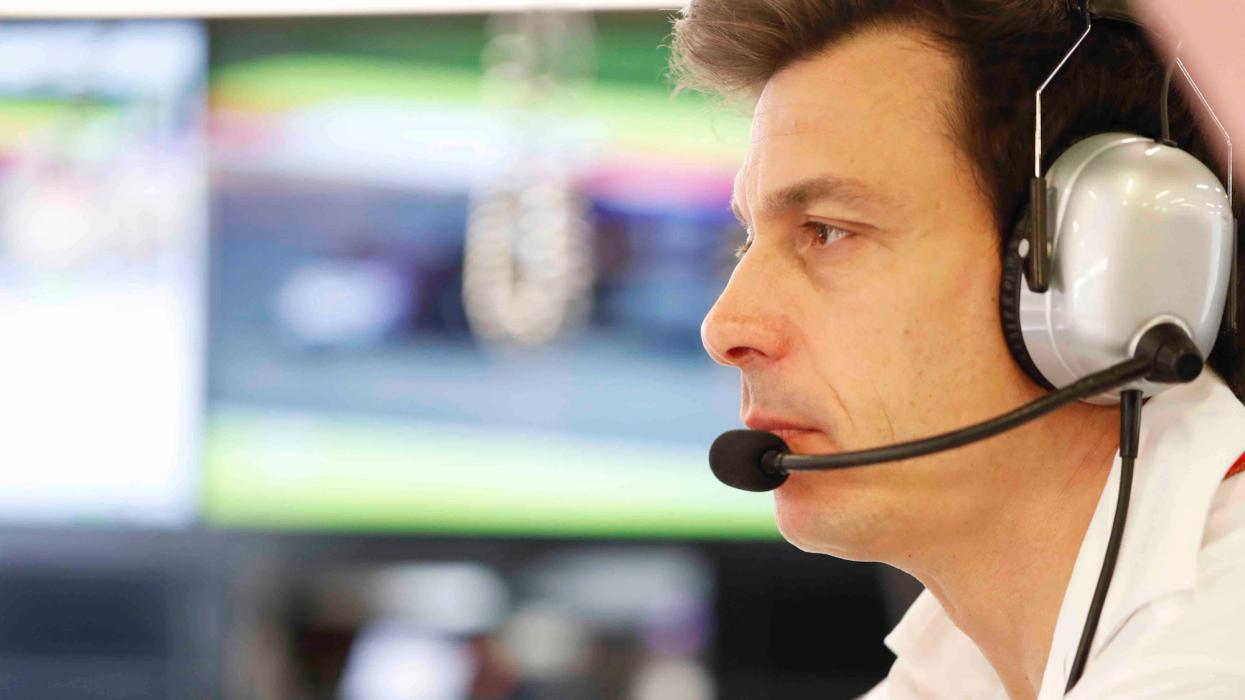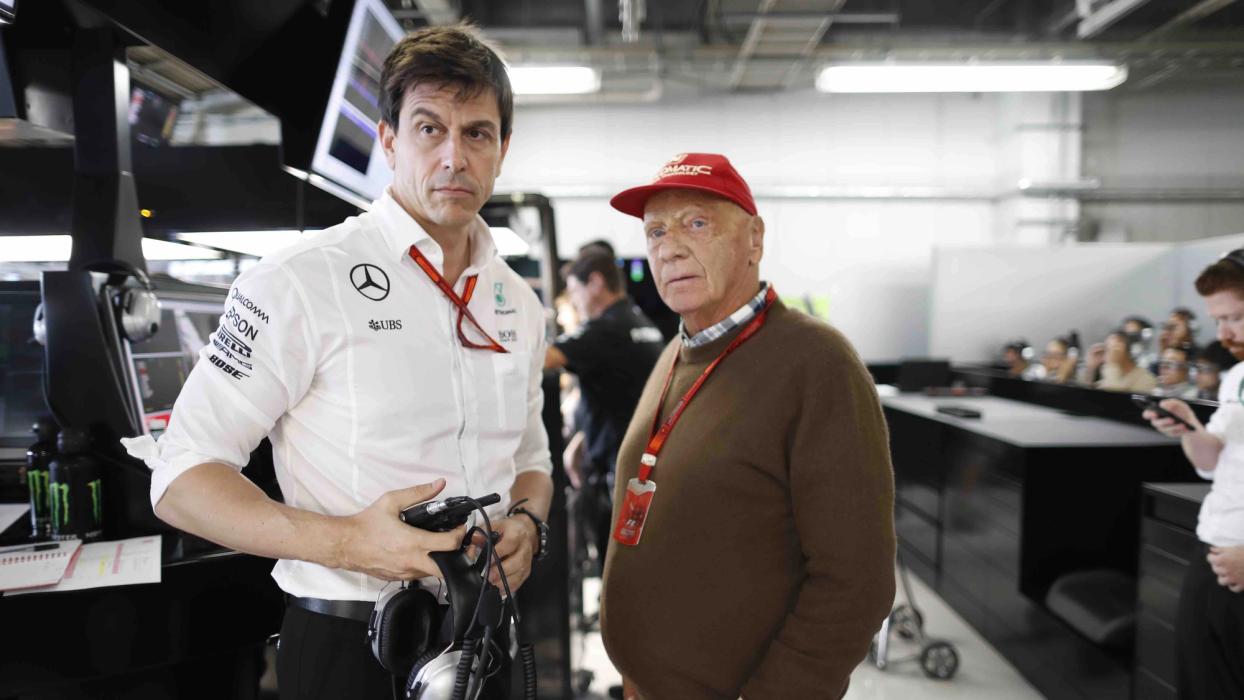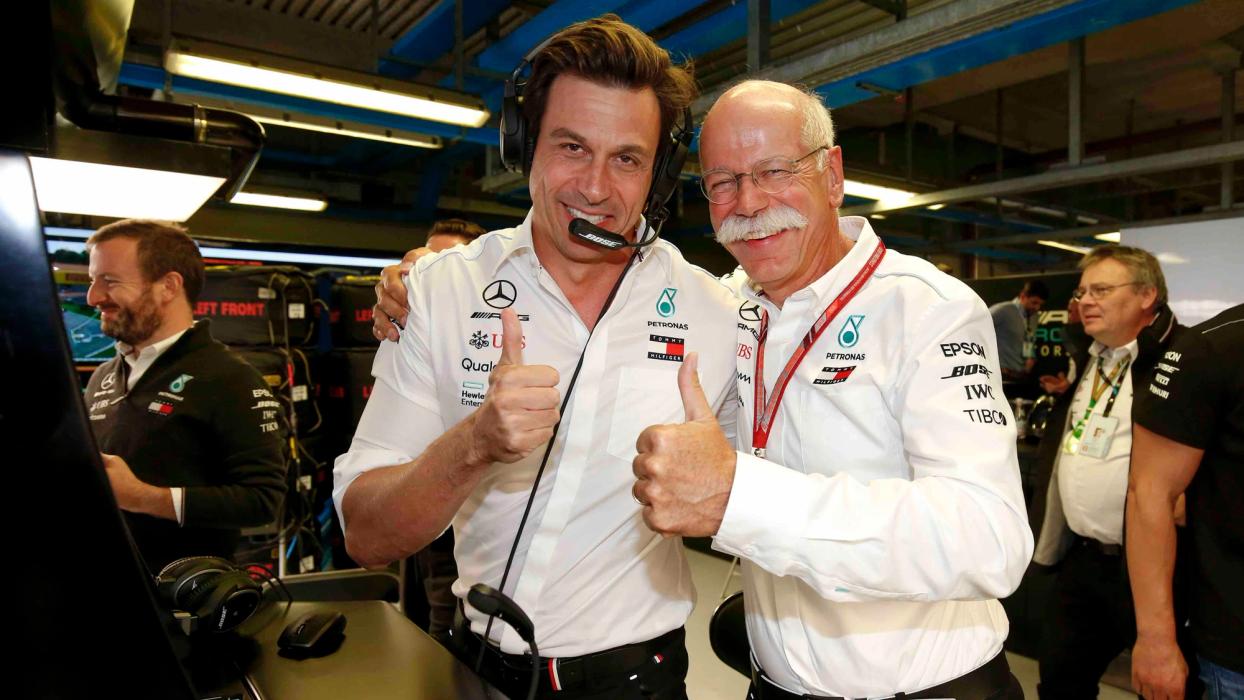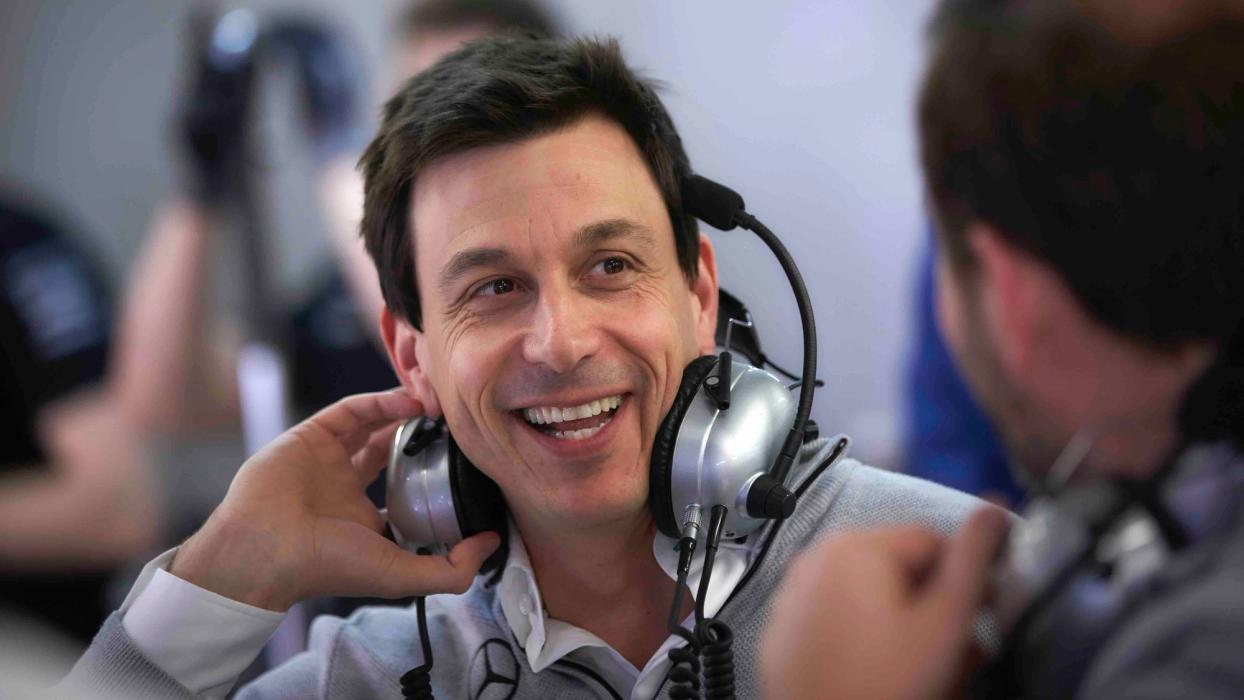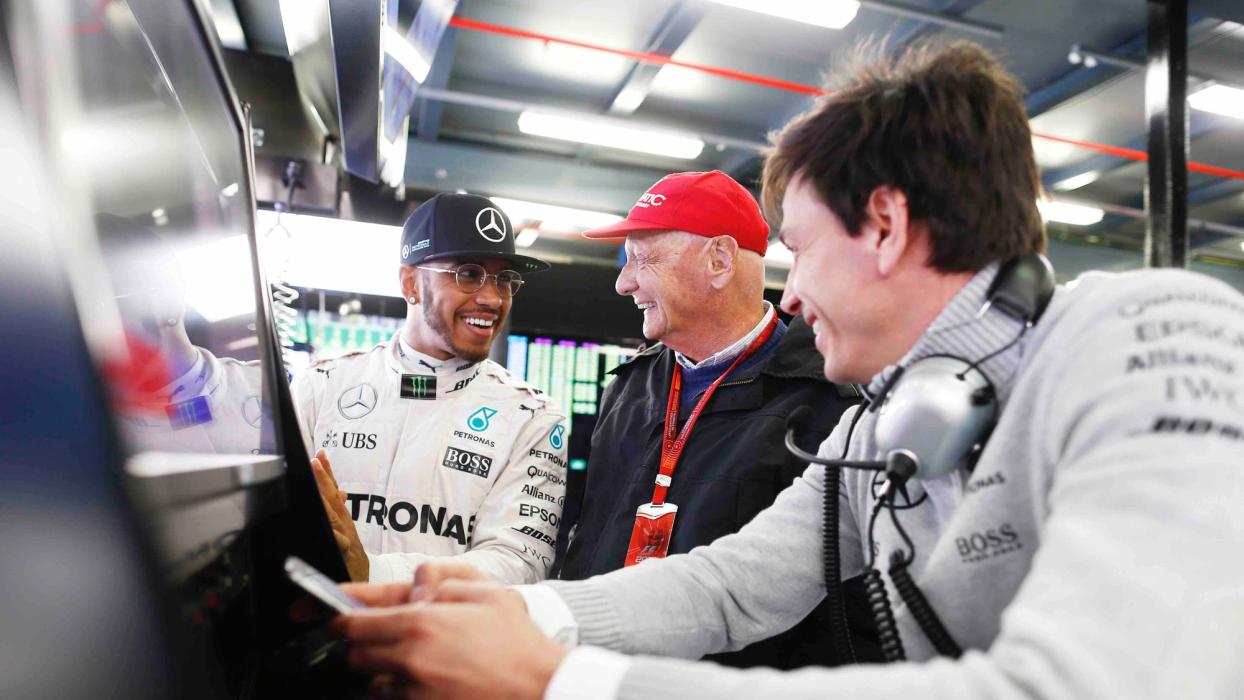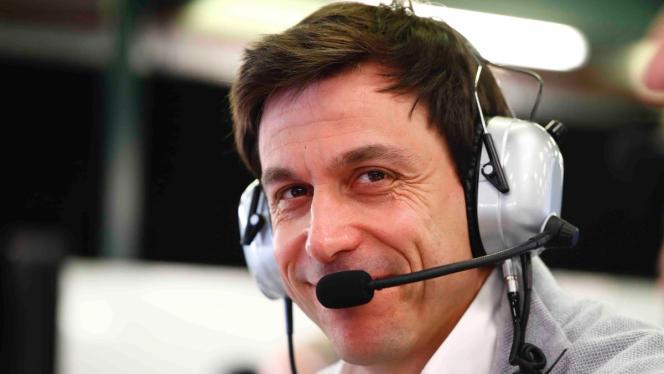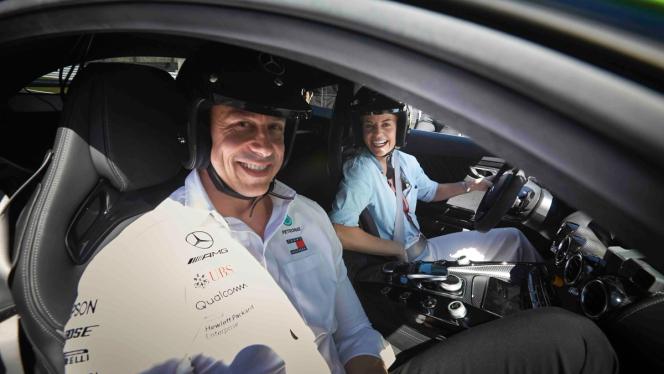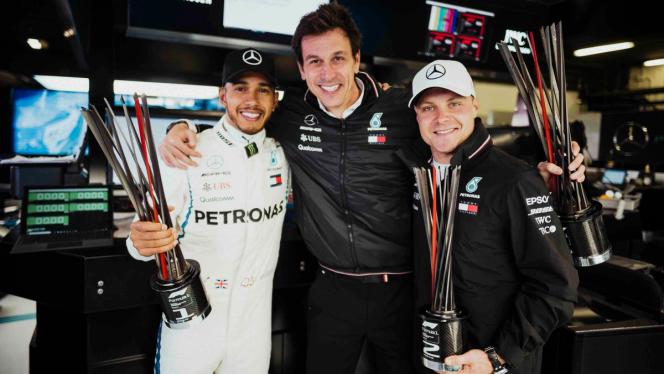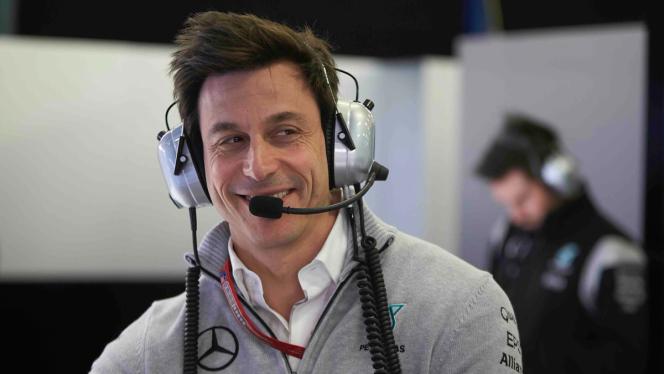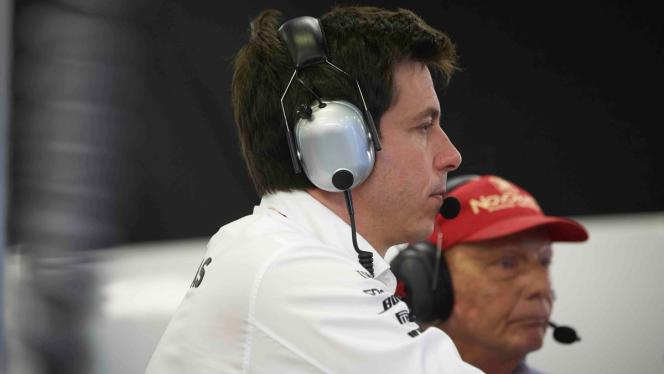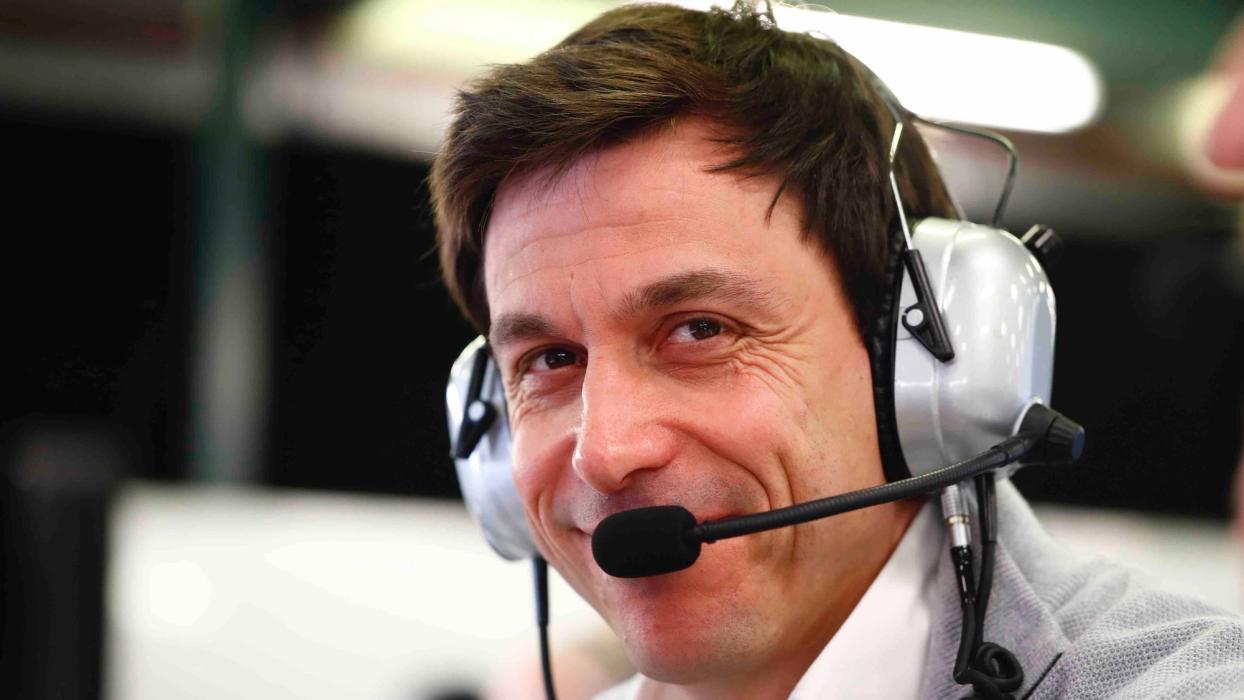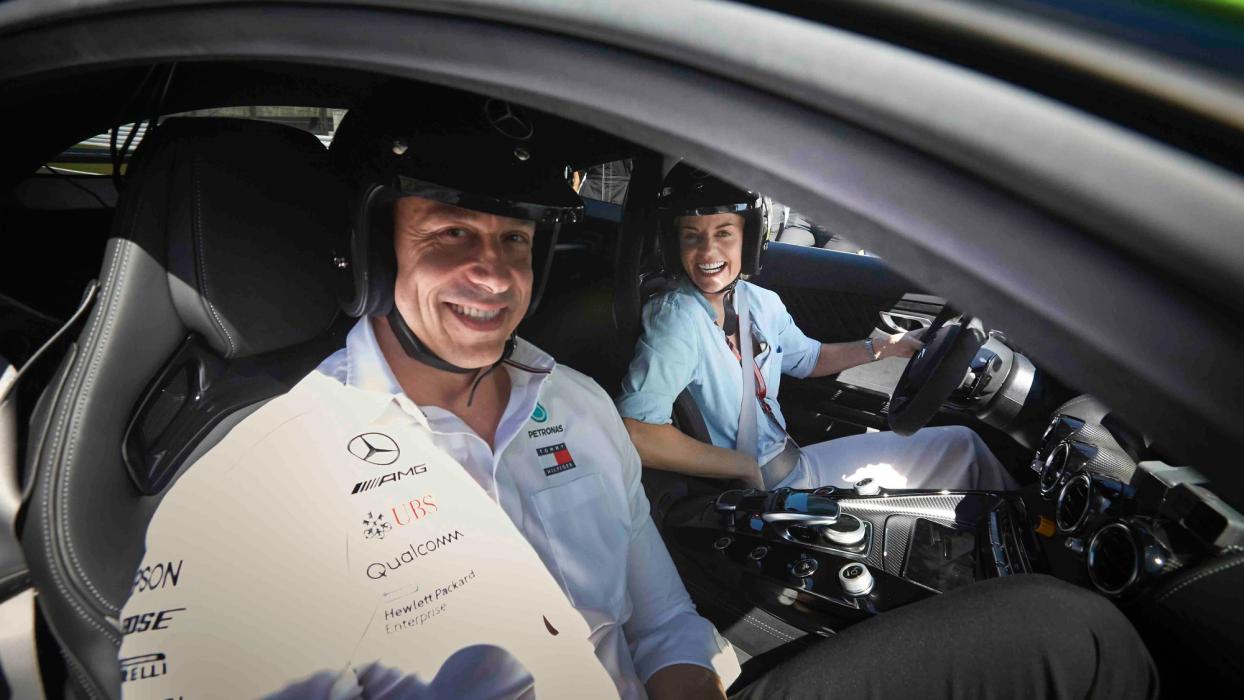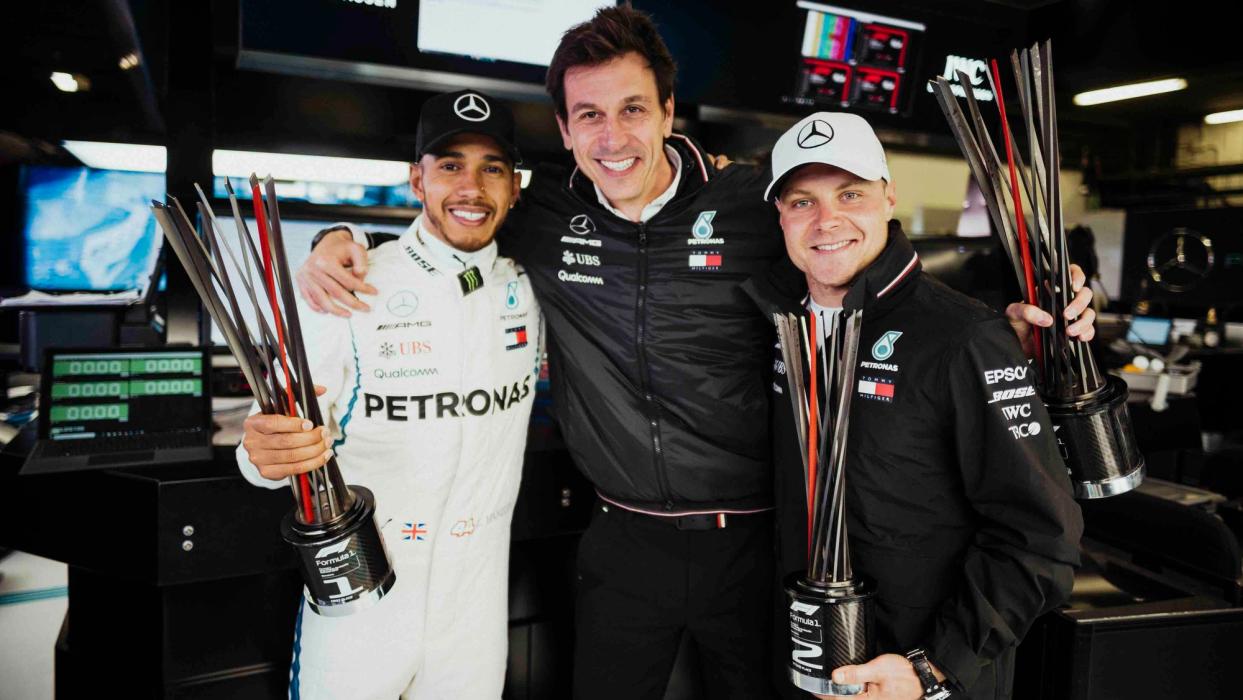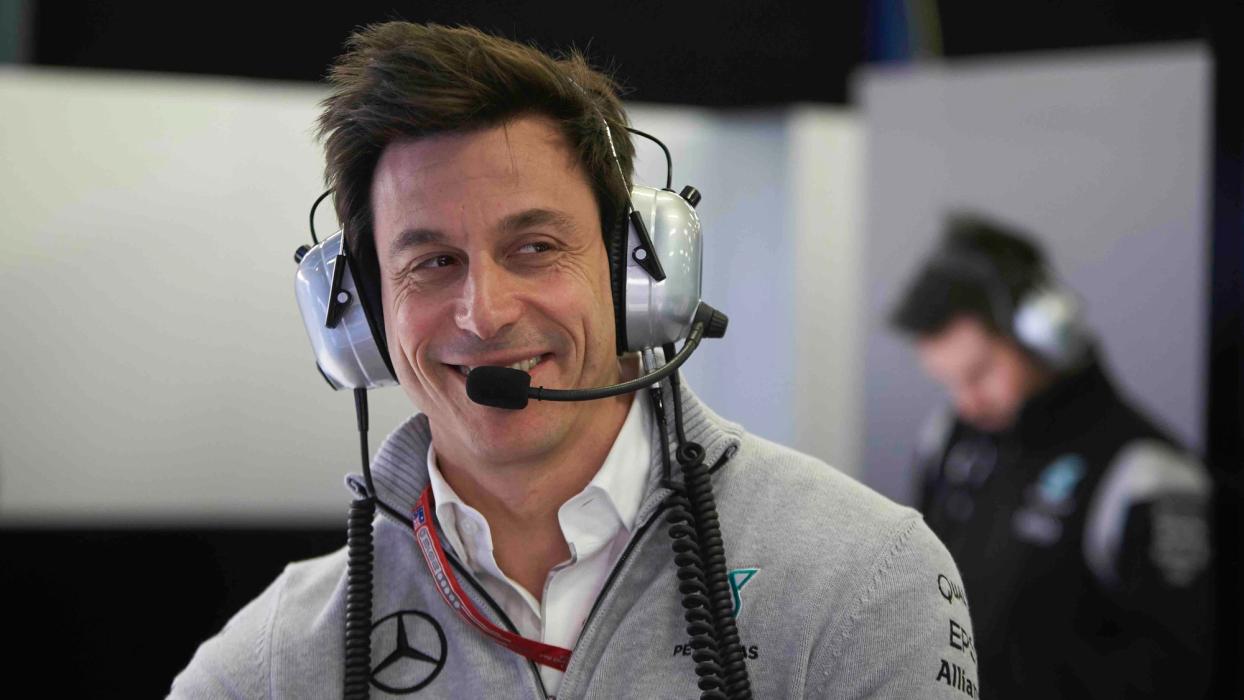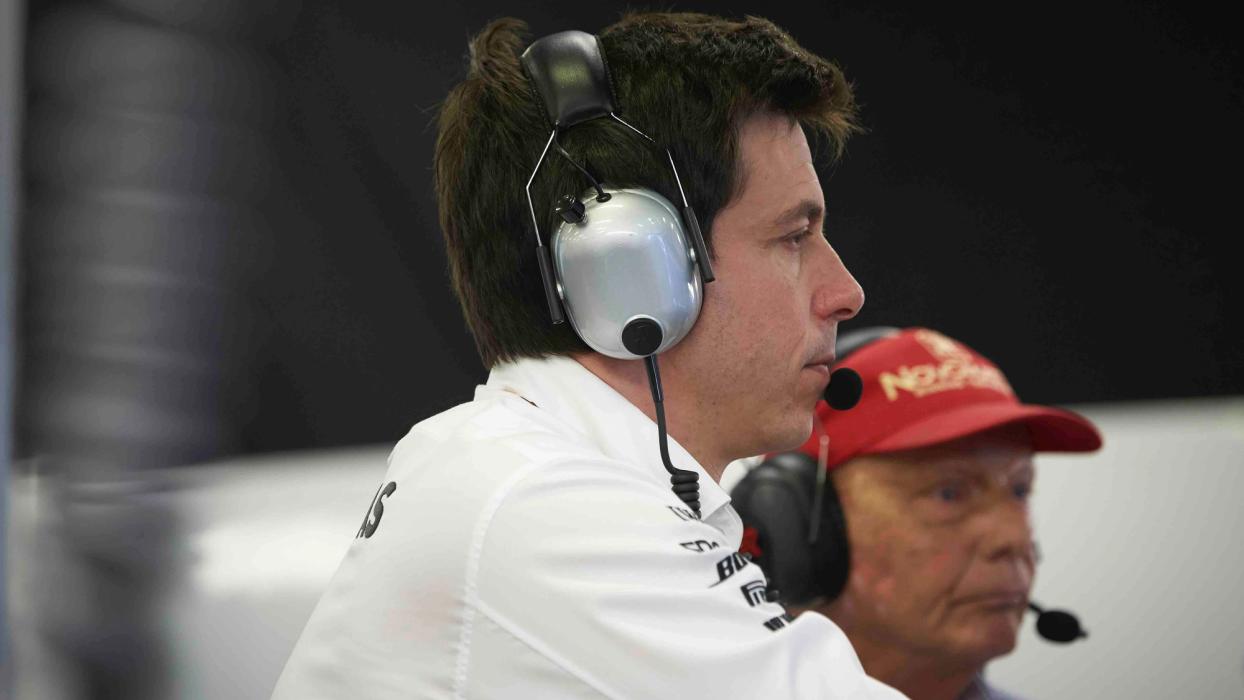Toto Wolff
Team player with a hunger for success
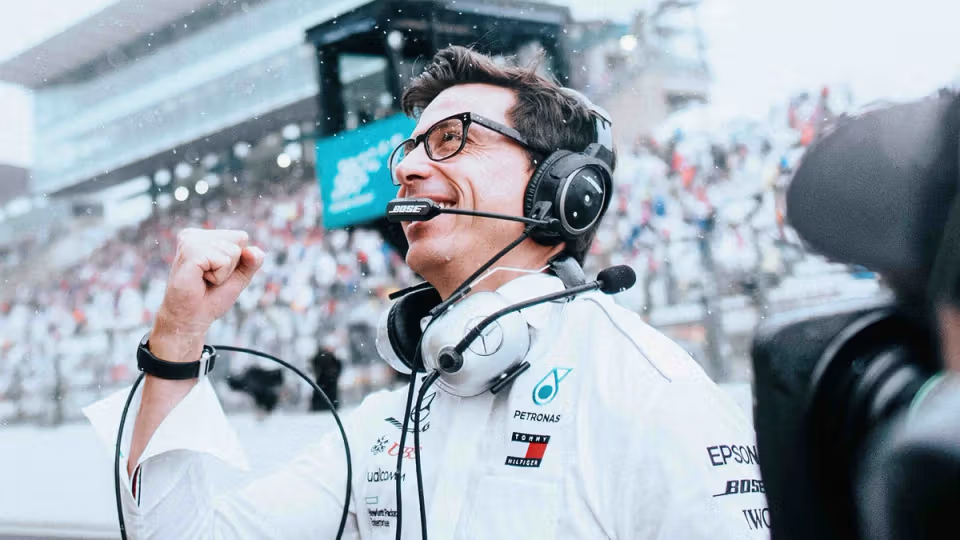
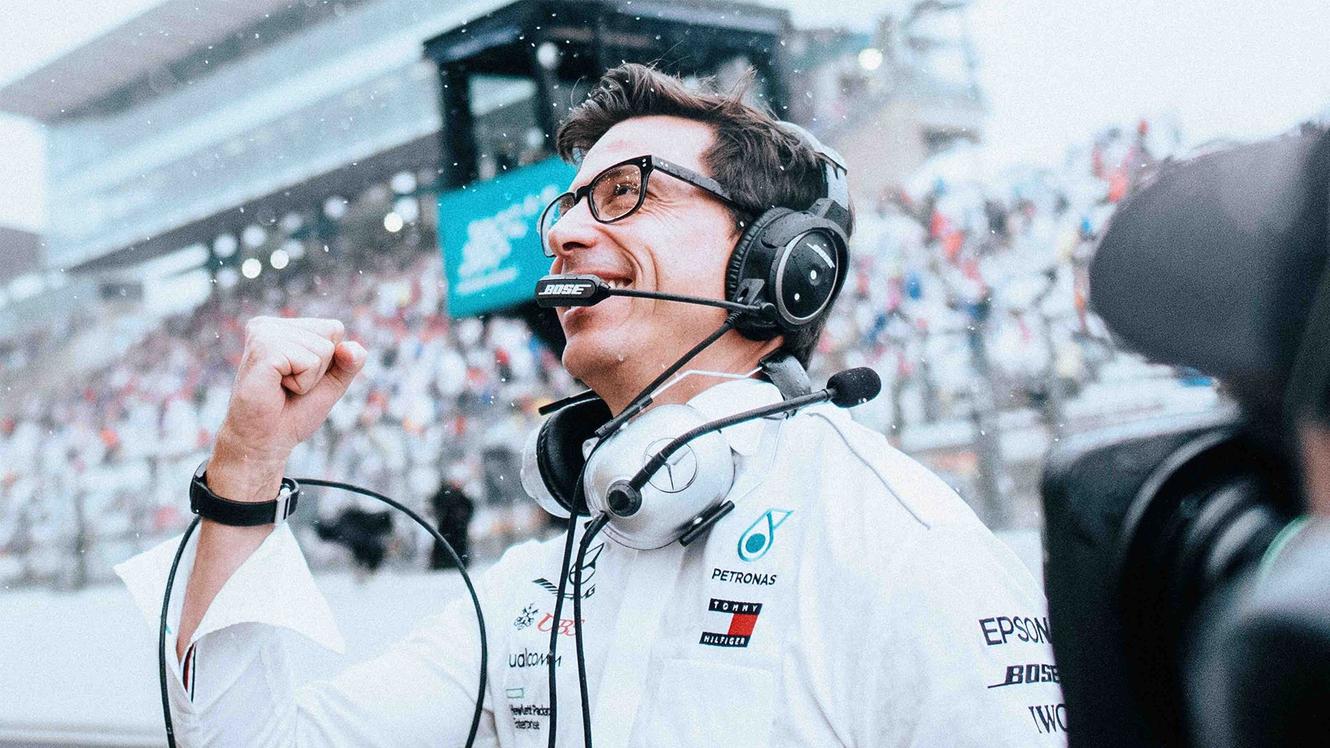
Under the leadership of Toto Wolff, the Silver Arrows have developed into one of the most successful racing teams in the history of Formula 1, with the team rushing from victory to victory, almost unbeatable on the track. From 2014 to 2019, the Mercedes-AMG works team won all twelve possible individual and team classifications in the World Championship. Lewis Hamilton alone became champion five times, the sixth driver's title is secured by Nico Rosberg, who announced his retirement immediately after his 2016 triumph and was then replaced by Valtteri Bottas in the cockpit. Six consecutive Constructors' titles have been won, a feat only achieved previously by the Scuderia Ferrari between 1999 and 2004. With twelve titles under his leadership, Wolff already ranks alongside Ron Dennis, Frank Williams and Jean Todt amongst the most successful team bosses in Formula 1 history. The secret of his success is a combination of empathy and perfectionism, which Wolff challenges and promotes within the team. He brings his personal experience from the cockpit that has been gained during his active motorsport career, even if it hasn’t gone completely as planned.
A passion for motorsport developed in the Vienna native, born on January 12, 1972, after a visit to the Nürburgring. At the age of 17, he followed a Formula 3 race on the legendary circuit together with friends and immediately fell in love with motorsport: “For a few years, racing was the only thing that counted.” In the following years, he also tried his hand behind the wheel. In 1992 Toto Wolff found himself in the cockpit of the Formula Ford, and in 1994 he won the 24-hour race at the Nürburgring in his racing class. And yet the young driver had doubts: "I was 19 or 20 years old when I became aware of something during a Formula Ford race: I was driving behind my friend Alex Wurz and although I could follow him, I knew he was doing something differently. His abilities were different. I realized that I didn't have the talent for it." The victory at the Nürburgring nevertheless put Wolff in the focus of the big teams who thus offered him a place in Formula 1. A unique opportunity he had always dreamed of – but he refuses. Wolff is convinced that his talent and his physical, as well as financial, prerequisites are not sufficient to be able to drive at the top of Formula 1 in the long term. "I tried to be realistic. We live in a world of specialists. Therefore, you have to understand what your talents are and where you can be successful. Then you have to develop it further." In 1994, Wolff announced his retirement from motorsport and focused on the business world.
This was followed by studies at the renowned Vienna University of Economics and Business Administration in commercial sciences. Wolff quickly proved his intuition for attractive and strategic business options. In 1998, he founded his first investment company. "You have to bring passion into your life. If you only go to your office without loving what you do, it is difficult to be successful." His strategic investments focused initially on internet and technology companies. In the end, however, Toto Wolff also found his way back to his beginnings in motorsport via investment transactions.
Together with the two-time Formula 1 world champion Mika Häkkinen, he became involved in the management of up-and-coming drivers, including the then Formula Renault driver Valtteri Bottas and the later DTM champion Bruno Spengler. "In a way, I tried to give back to young drivers what I was missing, and that was financing and advice." In the same year, he actively returned to the racetrack, if only as a hobby. In 2002 Wolff scored a victory in the FIA GT World Championship, in which he drove until 2006. It was a year of success, on and off the track. Wolff chose himself as runner-up in the Austrian National Rally Championship and won the 24h race in Bahrain. With the transformation of H.W.A. GmbH, the former motorsport department of AMG, into HWA AG, an attractive opportunity arose for Wolff to combine his interests in motorsport and investment. He acquired 49% of the shares from Hans Werner Aufrecht, one of the two founding members of AMG, which he did not sell until 2015. This was the beginning of strategic investments in the top tier of motorsport.
At the end of 2009, Toto Wolff joined the Williams Formula 1 team and quickly became a key figure. In 2012, he was promoted to Executive Director of the historic team. Wolff made a decisive contribution to the team's upswing as they achieved the first victory in eight years at the Spanish Grand Prix in the same year. For Williams, this was an outstanding success that not only made a major impact internally, but also attracted external attention. Shortly thereafter, Wolff received a call from Wolfgang Bernhard, the former Daimler board member. In a series of conversations, the central questions arose regarding how Williams managed to be successful as a small team and where Wolff saw deficits at Mercedes. From 2010, the brand with the star has been represented in the premier class of motorsport with its own works team, and also celebrated its first Formula 1 victory of the present day at the 2012 Chinese Grand Prix, but could not consistently compete to place well and fell short of its own expectations. In order to get to the bottom of the problem, those responsible gave Toto Wolff insights into the inner workings of the team and, at the same time, commissioned him to analyze the failures to date. Wolff's conclusion was that the Mercedes factory team was underfinanced compared to the competition – both in terms of budget and personnel, as well as a needing optimization of internal processes and structures.
The Stuttgart-based automotive company trusted Toto Wolff to not only identify the challenges, but also to find solutions: Starting in 2013, the Austrian took over the position of Executive Director in the Mercedes-AMG Petronas F1 Team and rose to become Head of Motorsport at Mercedes-Benz. He replaced Norbert Haug to lead the racing team with Formula 1 legend Niki Lauda, who joined the team in the same year as Chairman of the Supervisory Board. These two different characters complemented each other. While Lauda was valued both internally and externally as a Formula 1 legend and, thanks to his wealth of experience, was an important contact person for the drivers, Wolff drove development of internal structures and values forward. It was important to both Wolff and the Daimler AG that the entrepreneur had "skin in the game", which was why he joined the team with a 30% share. In the following years, he led the team together with his colleagues to successes never achieved before, while Wolff never got tired of putting the team's values first. "There are almost 2,000 employees on this Formula 1 project and everyone is doing their part. And I, in my role, do my part, but no more or less than many others who have made this team what it is today."
The new "See it, say it, fix it" philosophy was, alongside the outstanding engineers and drivers, one of the mainstays of the team's success. Wolff stood for a management style of open words, empathy and empowerment. "Appreciation is an essential part in every respect – and this is also true for us as a team. It is very important on a professional level in order to achieve the goals we have set together. On the other hand, you also need empathy in order to respect the fact that everyone has their own personal opinion." Wolff maintained a good relationship with his two pilots, who he valued for many years. While he already knew Valtteri Bottas from his time as his manager, he first met Lewis Hamilton in 2004 at a Formula 3 test race in Valencia. Before the race, Hamilton ran into the garage of the dominant ART team to inquire about the cars there. Immediately, Wolff, at this point manager of an ART team driver, was impressed by Hamilton's curiosity and interest. Years later, they met again: In 2013, Hamilton switched to the Silver Arrows as the successor to Formula 1 legend Michael Schuhmacher and is today well on his way to becoming record world champion himself, outstripping his predecessor.
Continued success was not a matter of course, as Wolff always emphasizes: "Success in Formula 1 is to win the next race, not the next championship." Since his entry in 2013, Wolff made the pursuit of maximum performance acceptable. In doing so, the balance between aspiration and compensation was important to him. He spoke openly about his own mental health and how he has consulted experts for years when problems arise. This is an approach that he took for granted and which he also established in the Formula 1 team in order to prevent overwork or a drop in motivation, as well as to relieve strain on employees, thus creating an optimal working environment.
Wolff has acted as a model for his required corporate culture. In meetings, he often opens by admitting his own mistakes in order to sensitize the entire team to be able to address problems openly. However, the focus was always on the problem, never on individuals: "We learn most of what we learn on our hardest days. If you are able to analyze a problem without looking for blame in one person, but in the problem itself, your organization can even emerge strengthened from a painful experience." The desired self-reflection was one of Wolff's greatest strengths, even if his skepticism did not exactly contribute to more joy in life, as he freely admits: "I am more the glass-half-empty type, which does not make my life any easier." He has spent his free time reflecting on past events instead of distracting himself with his smartphone. An approach that Wolff, who has been married to former racing driver Susie Stoddart since 2011, has also raised his three children with, albeit with moderate success: "My children are already fed up with the story."
As Wolff has travelled around the world with the Formula 1 circus, Susie has been active as a team boss with the Venturi Formula E Team since 2018. And the signs are good that the fabulous success of recent years will continue in the future: "I am very satisfied with my current situation. I have a fantastic relationship with Mercedes and the entire team. We can still achieve a lot together and I am looking forward to the future."
